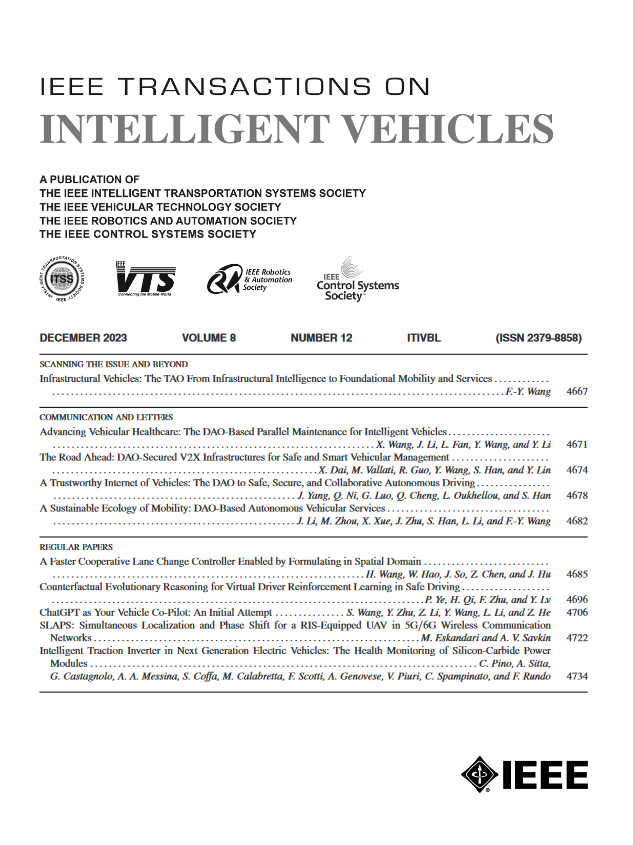在车辆网络中实现无缝数据安全、共识和交易
IF 14.3
1区 工程技术
Q1 COMPUTER SCIENCE, ARTIFICIAL INTELLIGENCE
引用次数: 0
摘要
协同驾驶是一种新兴的模式,旨在提高自动驾驶汽车的安全性和效率。为了确保合作的成功,道路使用者必须达成集体决策的共识,同时记录车辆数据,以分析和解决与此类协议相关的失败。这些数据有可能为各种车辆事件提供有价值的见解,同时也有可能改善问责措施。此外,车辆可以从它们之间的协商和交易服务中获益,为合作驾驶框架增加价值。然而,大多数旨在确保数据安全、共识或服务交易的拟议系统缺乏有效且经过彻底验证的机制,无法考虑车辆网络的独特特征。这些限制由于对基础设施提供的集中式支持的依赖而被放大。此外,相应的机制必须努力解决安全问题,特别是潜在的恶意或行为不端的节点,同时还要考虑无线介质的固有约束。我们介绍了可验证事件扩展(VEE),这是一种为智能交通系统(ITS)消息设计的应用扩展。VEE与任何现有的标准化车辆通信协议无缝运行,以最小的开销解决数据安全、共识和交易的关键方面。为了实现这一目标,VEE包含与区块链技术、拜占庭容错(BFT)共识协议和基于加密货币的机制相关的数据。使用这种机制,我们在现有ITS流量上搭载新协议,将对车辆网络的影响降到最低。为了评估我们的建议的可行性和轻量级,我们采用了一个硬件在环设置来进行分析。实验结果证明了VEE扩展在克服无线车载通信的分布式和机会性所带来的挑战方面的可行性和有效性。本文章由计算机程序翻译,如有差异,请以英文原文为准。
Enabling Seamless Data Security, Consensus, and Trading in Vehicular Networks
Cooperative driving is an emerging paradigm aimed at enhancing the safety and efficiency of autonomous vehicles. To ensure successful cooperation, road users must reach a consensus for making collective decisions, while recording vehicular data to analyze and address failures related to such agreements. This data has the potential to provide valuable insights into various vehicular events, while also potentially improving accountability measures. Furthermore, vehicles may benefit from the ability to negotiate and trade services among themselves, adding value to the cooperative driving framework. However, the majority of proposed systems aiming to ensure data security, consensus, or service trading, lack efficient and thoroughly validated mechanisms that consider the distinctive characteristics of vehicular networks. These limitations are amplified by a dependency on the centralized support provided by the infrastructure. Furthermore, corresponding mechanisms must diligently address security concerns, especially regarding potential malicious or misbehaving nodes, while also considering the inherent constraints of the wireless medium. We introduce the Verifiable Event Extension (VEE), an applicational extension designed for Intelligent Transportation System (ITS) messages. The VEE operates seamlessly with any existing standardized vehicular communications protocol, addressing crucial aspects of data security, consensus, and trading with minimal overhead. To achieve this, VEE comprises data associated with blockchain techniques, Byzantine fault tolerance (BFT) consensus protocols, and cryptocurrency-based mechanics. Using this mechanism, we piggyback new protocols on the existing ITS traffic, minimally impacting the vehicular network. To assess our proposal's feasibility and lightweight nature, we employed a hardware-in-the-loop setup for analysis. Experimental results demonstrate the viability and efficiency of the VEE extension in overcoming the challenges posed by the distributed and opportunistic nature of wireless vehicular communications.
求助全文
通过发布文献求助,成功后即可免费获取论文全文。
去求助
来源期刊

IEEE Transactions on Intelligent Vehicles
Mathematics-Control and Optimization
CiteScore
12.10
自引率
13.40%
发文量
177
期刊介绍:
The IEEE Transactions on Intelligent Vehicles (T-IV) is a premier platform for publishing peer-reviewed articles that present innovative research concepts, application results, significant theoretical findings, and application case studies in the field of intelligent vehicles. With a particular emphasis on automated vehicles within roadway environments, T-IV aims to raise awareness of pressing research and application challenges.
Our focus is on providing critical information to the intelligent vehicle community, serving as a dissemination vehicle for IEEE ITS Society members and others interested in learning about the state-of-the-art developments and progress in research and applications related to intelligent vehicles. Join us in advancing knowledge and innovation in this dynamic field.
 求助内容:
求助内容: 应助结果提醒方式:
应助结果提醒方式:


